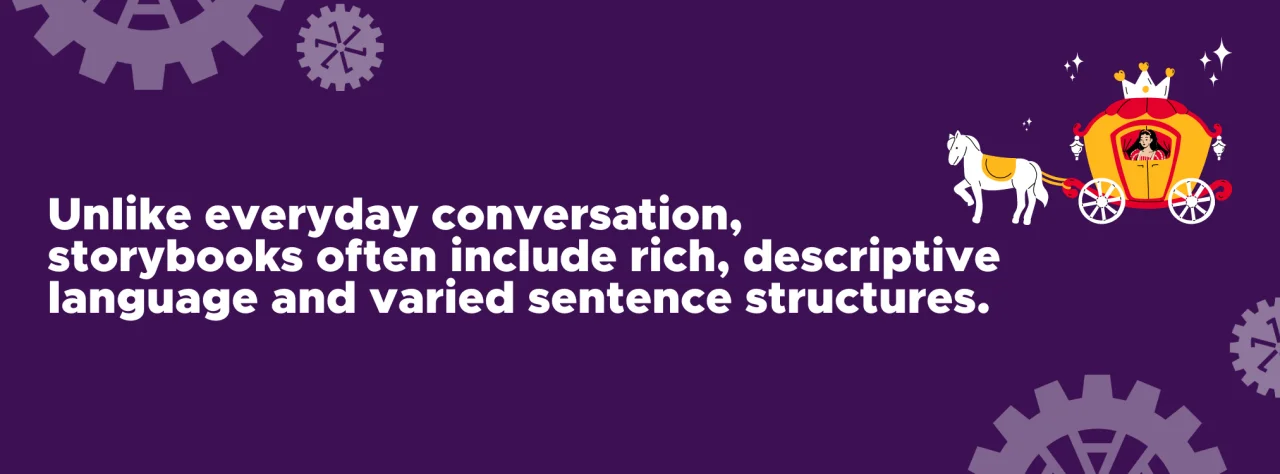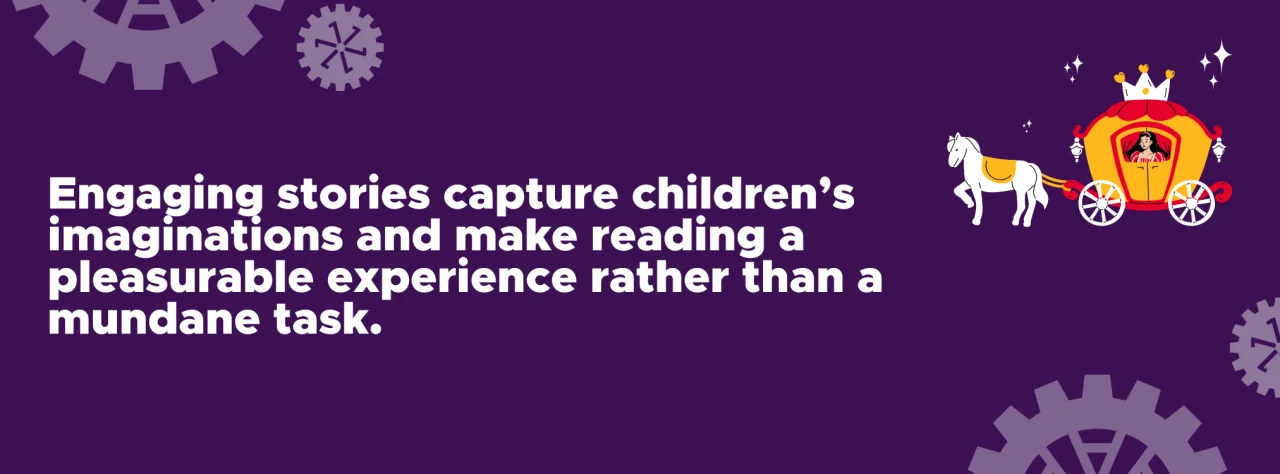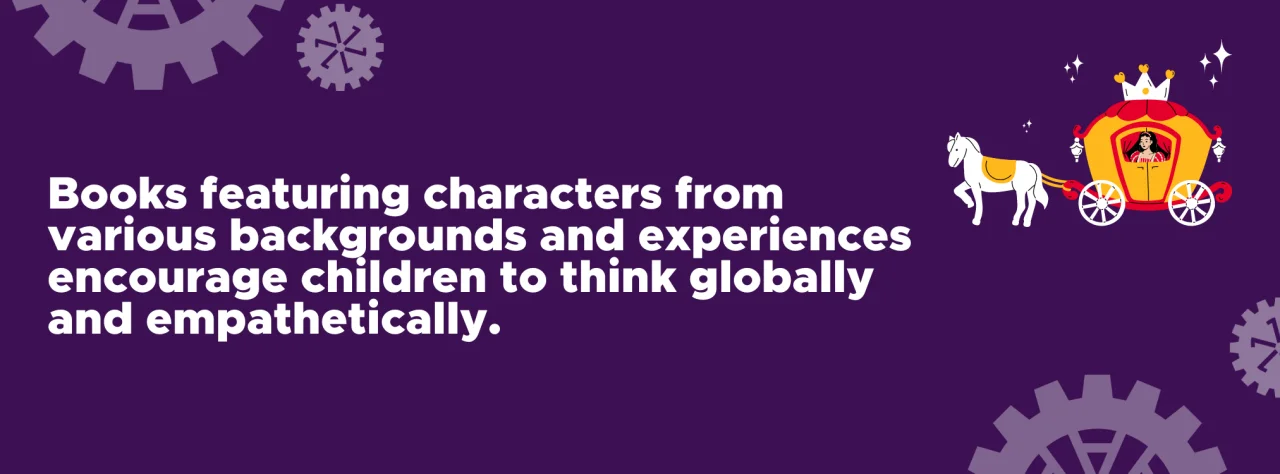26th August 2024
The Power of Storybooks: Building a Strong Foundation in English for Children
In our fast-paced, technology-driven world, it’s easy to think that the charm of a classic storybook gets lost amid the allure of high-tech gadgets and interactive apps. However, reading storybooks to children continues to be a powerful method for building a solid foundation in English and fostering a lifelong appreciation for language. Let’s explore why storybooks are so vital for young learners and how they help pave the way for developing strong English skills.

Enhancing Vocabulary and Language Skills
One of the main advantages of reading storybooks is their ability to introduce children to new vocabulary. Unlike everyday conversations, storybooks often use rich, descriptive language and diverse sentence structures. This helps children learn words in context, making their meanings easier to understand and remember. For instance, a story might use words like "glimmering," "treacherous," or "courageous" within an engaging narrative, allowing children to grasp these terms through their usage rather than by memorization alone.
Additionally, storybooks often feature idiomatic expressions, figurative language, and varied sentence patterns. These elements enhance a child’s grasp of English and support more creative and effective self-expression.
Developing Listening and Comprehension Skills
Reading aloud to children is an excellent way to enhance their listening and comprehension skills. When a parent or teacher reads a story, they model fluent reading, accurate pronunciation, and proper intonation. This helps children learn to process and interpret written language more effectively. Additionally, listening to stories encourages children to follow plots, recall details, and make inferences, all of which are crucial for reading comprehension.
Interactive storytelling, where children are encouraged to predict upcoming events or discuss characters' motivations, further boosts their engagement and understanding. This approach deepens their connection with the material, making reading a more active and enjoyable experience.
Fostering Imagination and Creativity
Storybooks offer more than just vocabulary lessons; they unlock imaginative worlds and diverse perspectives. As children immerse themselves in stories, they encounter a range of settings, characters, and scenarios, which stimulates their creativity and encourages imaginative thinking. Often, storytime leads to creative play, where children create their own stories or reenact scenes, deepening their understanding and enjoyment of the language.
The ability to imagine and create is closely tied to language development. When children craft their own stories or dialogues, they experiment with language in novel and creative ways, which enhances their grasp of vocabulary and grammar. This imaginative interaction with language also makes reading a more engaging and enjoyable experience.

Building Emotional Intelligence
One of the most profound effects of storybooks is their ability to cultivate a love for reading. Engaging stories ignite children’s imaginations and turn reading from a mundane task into an enjoyable activity. When children associate reading with pleasure, they are more likely to seek out books on their own and continue their reading journey as they grow.
Developing a love for reading early is essential for academic success and lifelong learning. Children who take joy in reading are more likely to read often, which improves their language skills, academic performance, and cognitive development. Storybooks provide the foundation for this passion, fostering a positive cycle where increased reading enhances overall proficiency.
Encouraging Family Bonding
Reading storybooks together is a wonderful way to enhance family bonds. Whether as a bedtime ritual or a weekend pastime, sharing stories fosters meaningful interactions between parents, caregivers, and children. This shared experience not only supports the child’s language development but also creates a nurturing and encouraging learning environment.
Additionally, when parents and caregivers participate in reading, they can help guide children's understanding and interpretation of texts. This involvement reinforces the language skills being developed and provides children with a model of enthusiastic and engaged reading.
Supporting Cognitive Development
Storybooks contribute to several areas of cognitive development. Through engaging narratives, they introduce concepts such as cause and effect, sequencing, and problem-solving. For example, a story where a character faces and overcomes challenges can illustrate perseverance and critical thinking. These cognitive skills are vital for both academic success and daily life.
Furthermore, the structure of stories, with their clear beginning, middle, and end, helps children understand narrative sequences and organizational patterns. This comprehension not only enhances their reading but also supports their writing and other forms of communication.

Expanding Worldviews
Storybooks often expose children to diverse cultures, historical periods, and societal norms. This exposure broadens their understanding of the world and nurtures an appreciation for diversity. Stories featuring characters from various backgrounds and experiences encourage children to think more globally and develop empathy.
By reading about different cultures and perspectives, children can enrich their vocabulary and gain a deeper understanding of how language reflects diverse experiences. This expanded viewpoint not only enhances their language skills but also improves their ability to communicate effectively in a multicultural society.
Conclusion
In summary, storybooks are crucial for building a strong foundation in English for children. They enhance vocabulary, improve listening and comprehension skills, stimulate imagination and creativity, and support emotional and cognitive development. Additionally, storybooks foster family connections and introduce diverse perspectives, enriching language skills and broadening worldviews.
For parents, educators, and caregivers, valuing storybooks is one of the most effective ways to support children’s language development and instill a lifelong love of reading. In a world often focused on screens, the simple act of sharing a story can be a meaningful gift, laying the groundwork for a promising future in English and beyond.
At NumberWorks’nWords, we recognise the crucial role reading plays in children’s daily lives. If you’re seeking additional support for your child, our team is here to assist. Contact us today to schedule a free, no-obligation learning assessment for your child.
More news articles
18th February 2026

The Stress-Free Guide to Learning Times Tables
Read more3rd February 2026

How NumberWorks’nWords Helps Children Reset After the Holidays
Read more18th January 2026

How to Reset Routines After the Christmas Holidays
Read more5th December 2025

How to Prevent the Christmas Holiday Learning Slide
Read more